The Waterfront (Part V)
Tonight's The Night
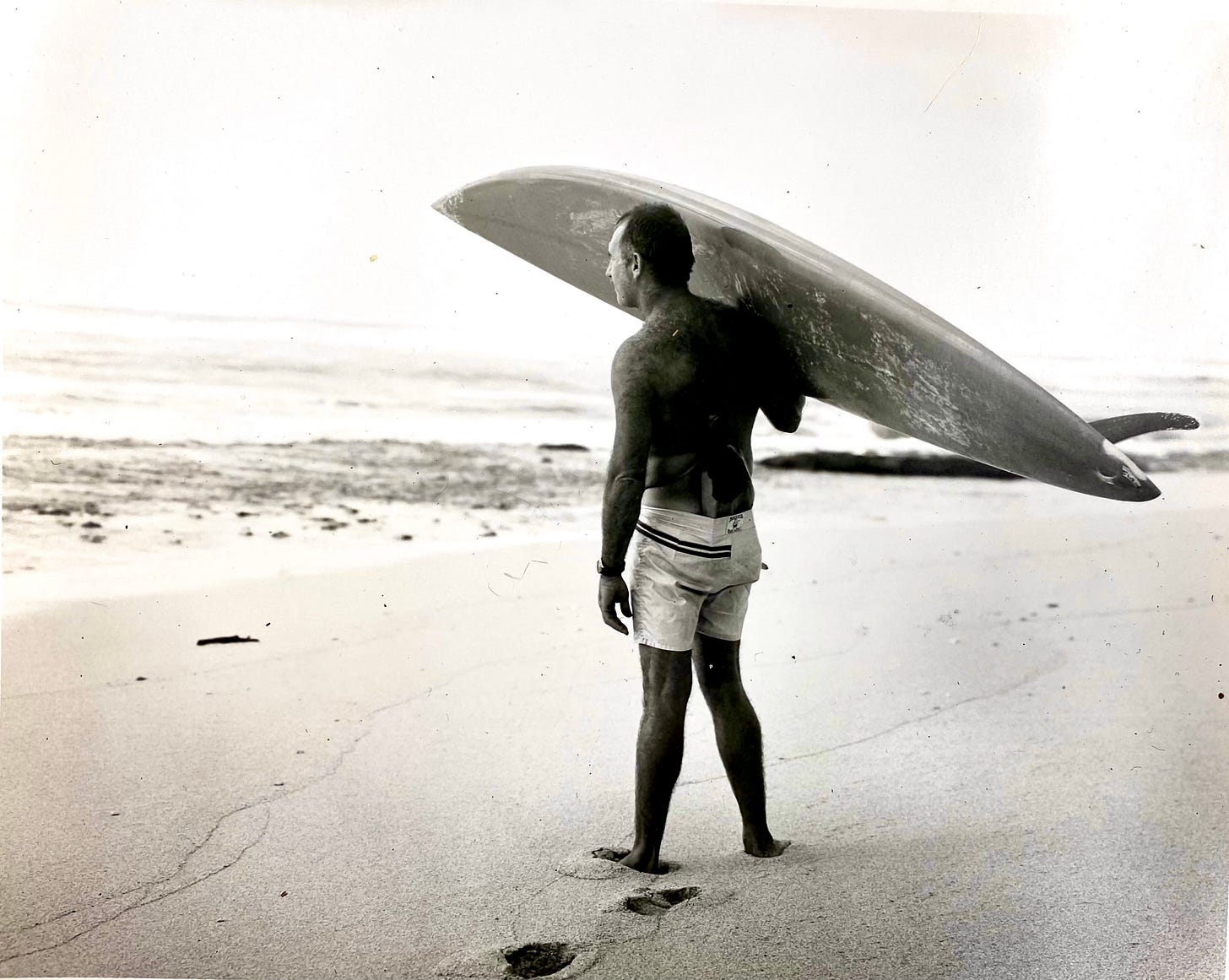
But the real voyageurs are only those
Who leave for leaving’s sake; hearts light as air,
They never do their destiny oppose;
Not knowing why, they always say: I dare! . . .
Uncommon fortune where the goal can change,
And, being nowhere, can be anywhere!
Where Man, whose hope will never cease to range,
Runs always, madly, to seek rest elsewhere! . . .
O Death, old captain, it is time! Set sail!
This land palls on us, Death! Let’s put to sea!
If sky and ocean are black as coal,
You know our hearts are full of brilliancy!
Pour forth your poison, our deliverance!
This fire consumes our minds let’s bid adieu,
Plumb Hell or Heaven, what’s the difference?
Plumb the Unknown, to find something new!
— Baudelaire (“Le Voyage”)
Just a kiss away . . . I remember the day he died. Sixteen years ago — seemed like any other day, for the most part. At the time, I had been working in Honolulu for an attorney, after having recently been awarded a Doctorate (Ph.D.) from The University of Hawaii at Manoa (Educational Foundations with expertise in the philosophy of education), yet I’d become altogether disenchanted with academia and teaching; so I walked away.1 An unexpected twist of fate landed me in the law offices of Arthur E. Ross and, for a spell, I worked closely with Mr. Ross, helping him with his law practice and the litigation of both criminal and civil cases, some rather interesting (e.g., a double murder trial: the notorious “Pomoho shooting” in 2004-2005; later we sued “The Surfer’s Journal” in 2007 for libel/defamation). I’m not a lawyer and have no formal legal training; but I was able to transfer the skills I’d honed as a scholar and philosopher (i.e., reading, thinking, and writing) to law. It was stimulating, challenging work, actually kind of fun for a while. Coming back from Town late that Wednesday afternoon (evening really), I stopped at Sunset Beach before heading home to cook dinner for my daughter. It was probably around 6 p.m., an hour or so before sunset.
I rolled into the sand at Sunset Beach and parked at Tower 25. That (the old tower) is gone now; the new one (much fancier) moved about 30 yards West down the beach. Across the street (Kam Highway), I saw Edis’ white BMW parked in front of Jack’s shop. I went over to check in and say hi, see what’s going on. Edis was working alone, finning a board. I noticed a Bud Tall Boy in a brown paper bag on the shelf next to him. “Bad sign,” I thought. Edis had been sober for a couple years at that point. That one beer seemed to changed things. I said nothing though.

We discussed the intricacies of fin size and placement, which was one of our favorite activities. Of course, Edis was the expert, it was his call ultimately; although we had this running esoteric conversation (sort of debate that spanned years) as to what is the ideal size and where to precisely place the fin — on fellow lifeguard Rick Williams Owl pintail.2 A single fin. I don’t know (or care) much about thrusters (3 fins) or any multi-fin set up to be honest, although I’ve had plenty.3 Edis and I are both single fin devotees, the last holdouts (along with Eric) of our generation to tell the truth. And the prevailing wisdom in JR’s shop (which was & remains Ground Zero for the completion — lamination — of the best Brewers and Chapmans) regarding the ideal size and placement of a single fin alternated between an 8” fin placed approximately 8” from the tail or a slightly larger 9” fin placed a little farther forward, about 9” from the tail. We’re talking about the basic broad-based Brewer template that was innovated, designed, refined, and perfected by RB, JR, and Owl during the 1970s (1973 to be precise, but that’s another story).


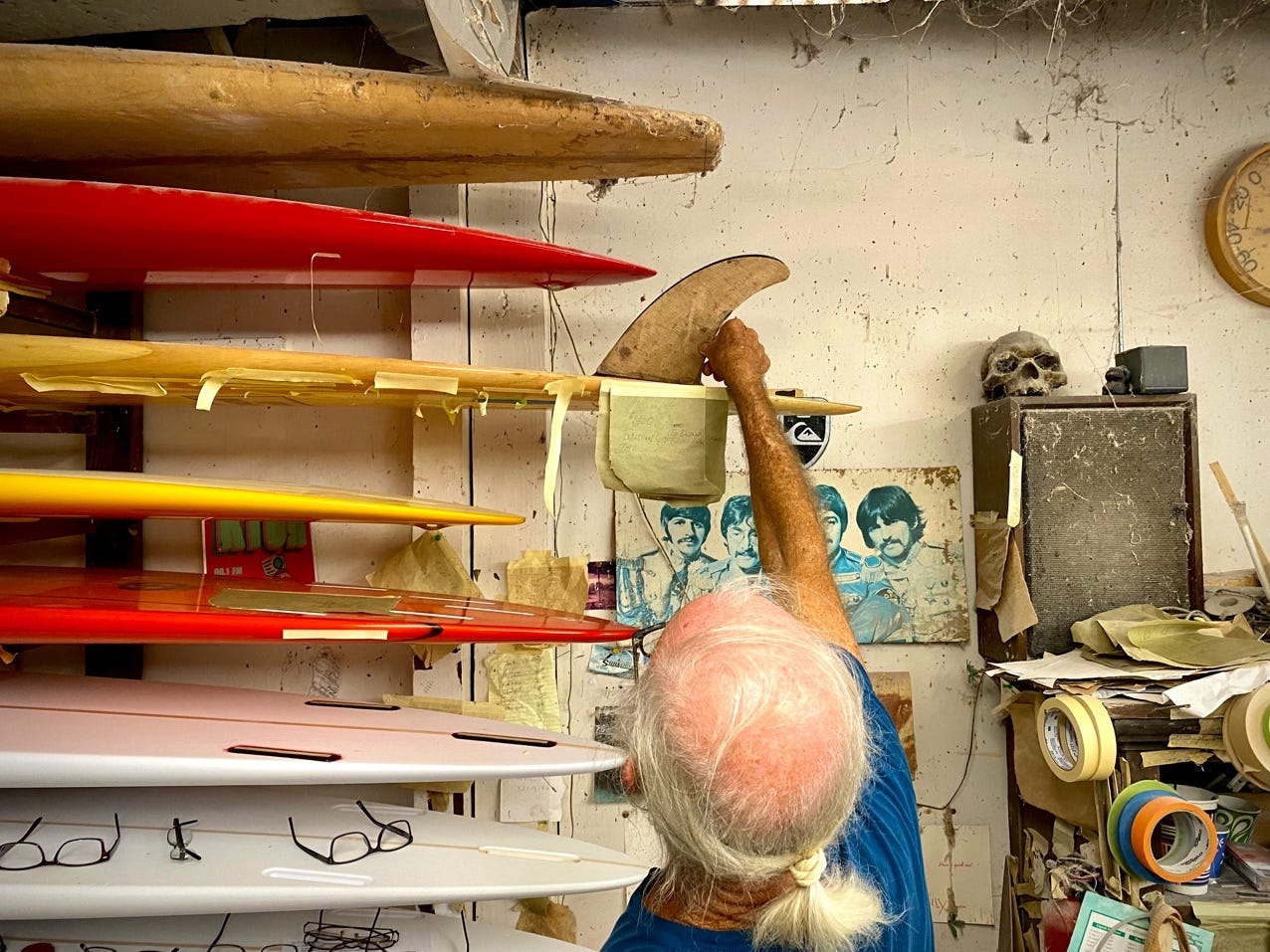
Broadly considered, Jack prefers the former (8”), whereas Owl prefers the latter (9”), or at least he used to. In my experience, I’d say that the 8” fin and placement works better on mini-guns (7’6” – 9’); whereas the 9” fin and placement works best on full guns (9’6” to 12’). It really all depends on where one stands on the surfboard. For example, I tend to stand a little forward (full forward trim) on my boards, so the 9” (or even a 10”) fin and placement works best for me.
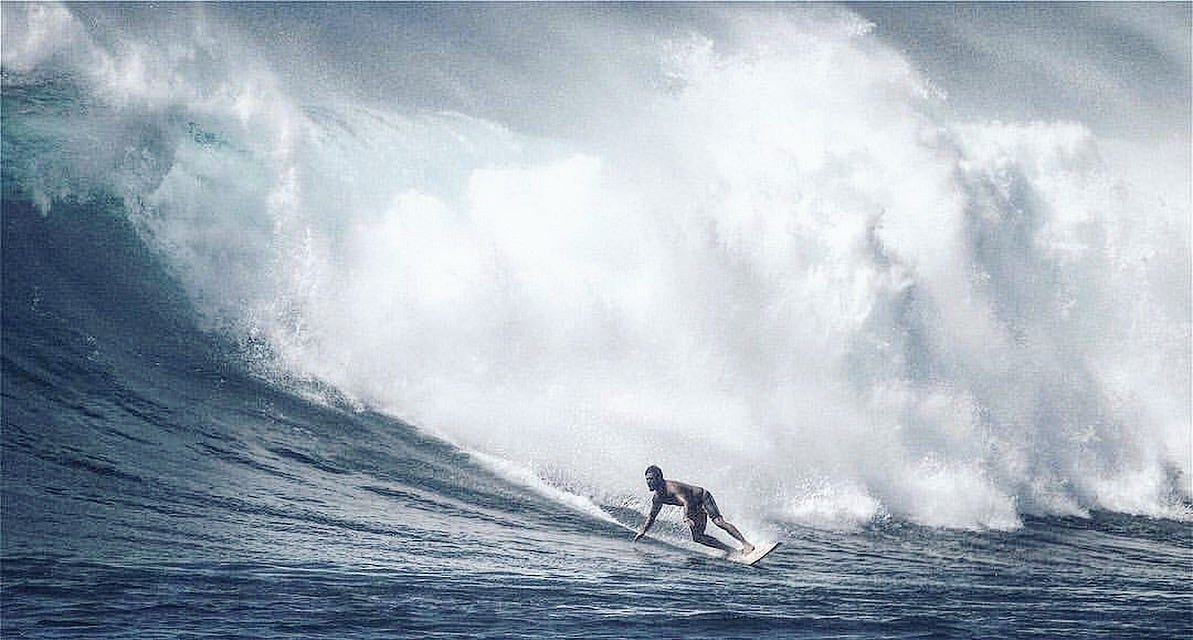
Those that stand further back, with their back foot closer to the tail, over the fin, tend to prefer the smaller fin further back. The other thing is that, generally speaking, the further back the fin, the more drive; and the farther forward loosens it up. It’s a delicate balancing act and ultimately a matter of taste regarding so-called “punch & drive.” This is what we discussed as Edis took a sip of his beer. We settled on the 9” fin and placement. I felt satisfied and vindicated.
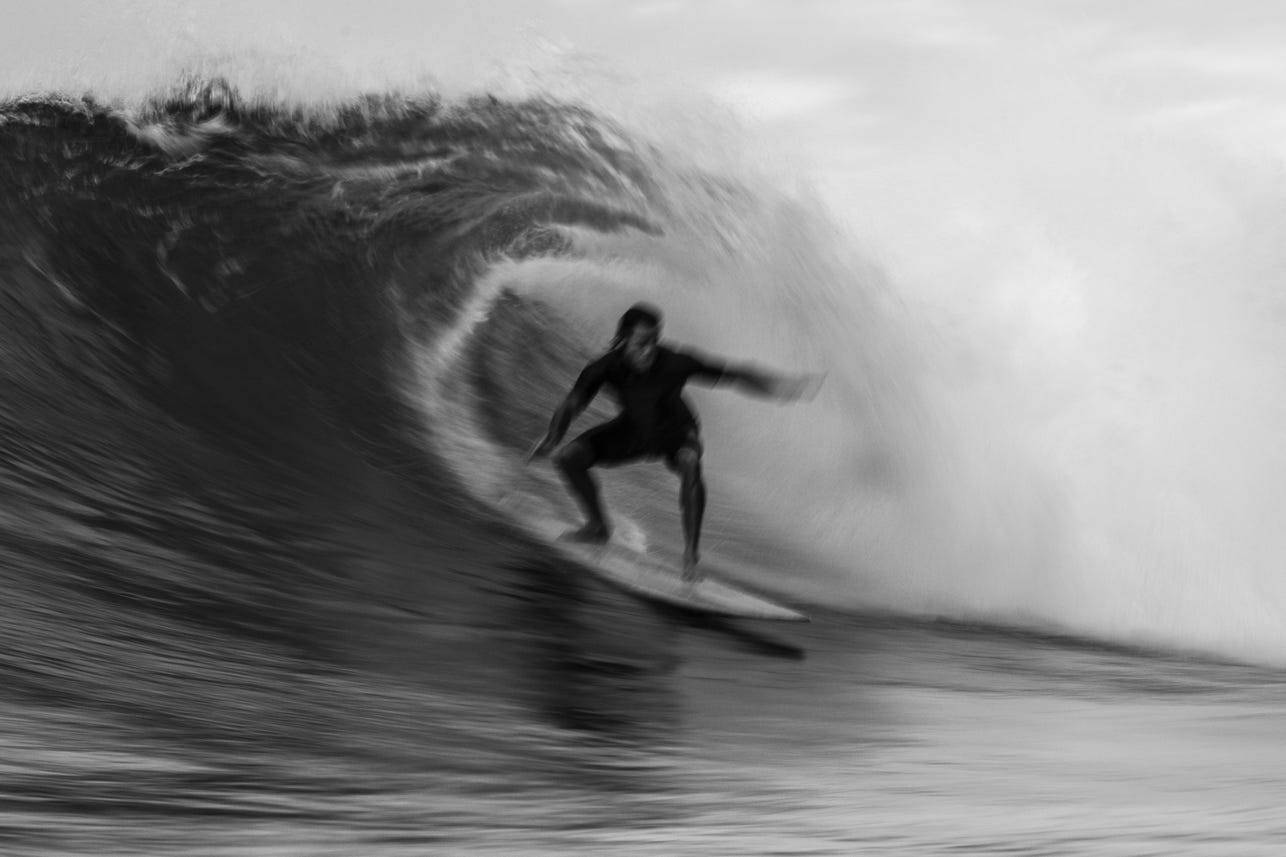
“Let’s go out for dinner tonight,” he said cheerfully, “my treat!” It sounded tempting. But I had to get home soon, make dinner for Bruna (my daughter, 6 at the time), get her bathed and into bed. That was my Kuleana (responsibility). I said as much. Edis persisted. He was all: “Nah! Come on! Let’s go out and have some fun! My treat!” He was chipper, in a good mood, probably a little buzzed, on an upswing; and he wanted to go out.
. . . hearts light as air,
They never do their destiny oppose;
Not knowing why, they always say: I dare!
Edis wrapped things up in the shop, finished the beer, hit the lights; and we left. Edis locked the door behind us, we walked across the street. He left his BMW parked at the shop.

Owl and Eric were next to my silver Ford station wagon by the Lifeguard Tower #25. Eric was sprawled on the hood of my car; Owl was sitting behind the wheel of his car, next to mine, with the door open. Music was playing (Buddy Guy). They were smoking a joint. The sun was sinking into the ocean behind them. It was a halcyon moment like a million others before and since, pau hana, end of the day. Little did any of us know what was to come: Tonight’s the Night . . . (cue: Neil Young).
Tonight's the night, tonight's the night
Bruce Berry was a working man
He used to load that Econoline van
A sparkle was in his eye
But his life was in his hands
Edis said: “Hey guys! Let’s go out for dinner! My treat!” Eric handed me the joint, I took a hit and passed it to Owl, sensing the charge of the moment. It seemed like old times. Edis didn’t make a move for the joint and nobody passed it to him. That was a good sign, although he never liked smoking pot that much anyway. I simply said: “I gotta go. Have fun. I’ll see you later.” And that was it. I got in my car and drove home to Sunset Point. The last time I saw Edis alive, in the rearview mirror: him, Eric, and Owl — The Underground. So it goes. Things would never be the same again.
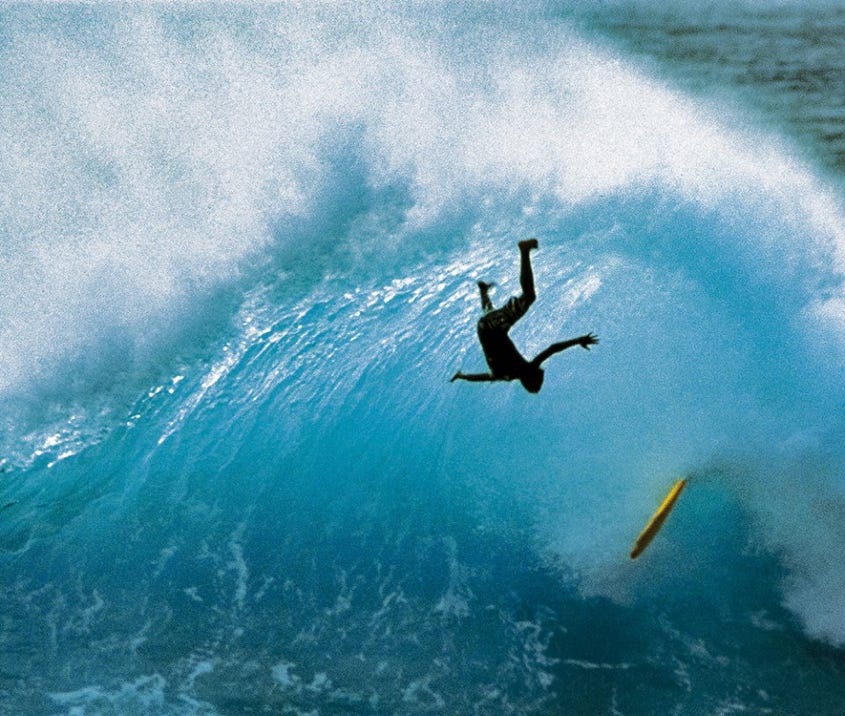
They went to Banzai Sushi in Haleiwa for dinner and that’s when things got rolling. I heard the story of events, how it went down from both Eric and Owl, many different times. It’s not a pretty story. Of course, I didn’t learn about what happened until the next morning and later again after that . . .
'Cause people let me tell you
It sent a chill up and down my spine
When I picked up the telephone
And heard that he'd died out on the mainline
Early the next morning I opened the gate to my driveway as I was on my way to work. There was Eric. He didn’t look good. His eyes said it all. Somehow (I can’t know, even now, 16 years later) I just knew. Eric didn’t say a word. He just looked at me kind of sideways, like he was ashamed and hurt. “He’s dead.” That’s all I said — it wasn’t even me speaking really, the words came out or through me as if I was a cipher. Eric slowly nodded and closed his eyes. We both started to cry. We held each other. I asked him where Owl was. Eric shook his head; said nothing. He was speechless.
It was Edis’ treat that night. He paid. In every conceivable sense. And for the last time. They were drinking. One beer led to another and so on. They were enjoying themselves and loosening up like they hadn’t done together in years. The ate their food, the bill came, Edis paid and said: “Let’s go get a paper! My treat!” Eric paused, instantly sobered up a little and said (according to him): “NO! Edis, NO! You can’t do that!”
A “paper” is slang for a fix of heroin. It’s like music to a junky’s ears — and Owl knows that tune. Moreover, when Eric Haas is the voice of reason and restraint, you know trouble is coming. Eric tried in vain to restrain his brother. He both recognized and understood only too well what was at stake — not so much life and death, at that point, as sobriety, health, sanity, and all that work, blood, sweat, time and tears Edis had sacrificed for the past several years to overcome and get back to where he’d struggled so hard and long to be. There was a lot on the line. Eric attempted unsuccessfully to dissuade Edis from the urge and temptation, but the spell, it seemed, was cast. Owl was in. He knew where to go.
Uncommon fortune where the goal can change,
And, being nowhere, can be anywhere!
Where Man, whose hope will never cease to range,
Runs always, madly, to seek rest elsewhere!
Eric refused. He wasn’t going. Once again, he tried to persuade Edis to forget about the “paper” and go get more beer or something — anything! — but not that. “Let’s go Town, Edis! We go to the salon — see the girls! Let’s go, brah!” Edis wasn’t interested in girls or Town or beer anymore. Eric was crestfallen. Owl sat there silent, said nothing. Edis got up and walked toward Owl’s car. Eric pleaded: “I’m not going! Don’t do it, Edis! Please!” Eric was angry, deeply upset, and ran off into the night . . .
Owl followed Edis to the car. He got in next to Edis and they made their way inexorably toward 66-477 Paalaa Road, the Haleiwa Senior Citizen Housing Center next to McDonalds. They knew where to go and who to see in order to get the paper. They entered the apartment. The dealer guy was there with some strung out chick. There were four of them in the room. Edis paid for a couple of papers, handed one to Owl. Owl fixed up first, got what he wanted. The chick got her fix, too. Then it was Edis’ turn. I can’t imagine what he was thinking, but he was drunk at this point. As any junky will tell you (as some have told me) the urge or appetite is as overpowering and seductive as it is irresistible. There’s really no rational “choice” in the matter once one finds oneself at this stage of the game. The Lure of the Poppy is simply too strong.
Pour forth your poison, our deliverance!
To be fair to everyone involved or otherwise implicated here, this situation is way beyond good and evil and has little — or nothing — to do with reason, justice, or morality (at least at this stage). Others can (and will) judge; but when it comes to drug addiction there’s not much one should say if one doesn’t know or understand what it feels like to be a drug addict in the throes of that desperate hunger. Nobody really chooses (or wants) to be a drug addict; although, of course, they all do.4 That’s the cruel, fatal paradox. Edis was craving — hungry for — the Rush of Euphoria as much as the Escape (the pathos of distance) from Reality, the Numbing of Existential Pain, Anxiety, and Worry. Just a shot away . . .
Ooh, a storm is threatening
My very life today
If I don't get some shelter
Ooh yeah I'm gonna fade awayWar, children
It's just a shot away
It's just a shot away
War, children
It's just a shot away
It's just a kiss away . . .Kiss away, kiss away . . .
— (The Rolling Stones “Gimme Shelter”)
Edis shot up. His first in over two years. Bang! It was too much for his system. He keeled over immediately, passed out cold. Veteran heroin users, I’m told, are, if not expert, at least experienced in handling these kinds of emergency situations. They happen all the time. It’s not unusual for someone to overdose and lose consciousness after shooting up — especially a neophyte or someone, such as Edis, who hadn’t used in a long time. Heroin (like all opiates) builds tolerance in users; and someone who hasn’t used (years in Edis’ case) has little to no tolerance. That couldn’t be said of the others present, which accounts for — in all probability — the dosage size of the fix the dealer gave Edis that — in all probability — matched that of the others. It should have been smaller, just to be safe. But Edis (no one apparently) wasn’t thinking about safety that night. He had the Hunger . . .
A crazed, chaotic moment. I can only guess that everyone was desperate, confused, extremely anxious. And high. No one was thinking straight . . . Except Edis, who was lying there unconscious. He wasn’t breathing. No heartbeat. Someone said: “Get him in the shower! Now!” They dragged his body into the bathroom, put him in the tub, ripped his shirt and pants off, and turned on the shower. Cold water washed over his limp body. Nothing. He just lay there unresponsive. That’s when someone — anyone —should have called 911— at that very moment (if not before). Calling the paramedics was not only the right thing to do, it was absolutely necessary. Edis’ life was at stake. They might (should?) have been able to save him . . . That was their Kuleana — a moral imperative. But no one called. They all just split, escaped into the dark night. Edis lay in the shower abandoned and alone. Dead.
Everything is still asleep, he said; even the sea is sleeping.
When Jack Reeves got to his shop the next morning, he noticed that Edis’ white BMW was still parked in the driveway and thought to himself: “That’s unusual.” Soon thereafter, Owl showed up, looking morose. Jack knew something was terribly wrong. “Owl was speechless.”
Later that morning someone (the chick, I believe) called HPD. So, the police got involved and there were rumors of a homicide (i.e., “wrongful death”) investigation, which ultimately got nowhere. Others claimed, at first, that Edis had “accidentally fallen in the shower and hit his head” (or some bullshit); but the cause of death was finally determined by the medical examiner to be heart failure as the result of a drug overdose. Owl went incommunicado. He disappeared for several weeks; and he didn’t attend the Memorial and paddle out at Sunset Beach to scatter Edis’ ashes. Neither did Eric. I was there along with about 50 or so others, including Jack, a lot of lifeguards, fellow surfers, Edis’s friends and some people from the community, as well as a few of Edis’ close family members. His cousin, Deanna, arranged the memorial ceremony. There was a poster board with some photos, we were all given a handout with a photo of Edis including a poem.
Sometimes these memorials and paddle-outs turn into a celebration.5 Not this one. It was profoundly heartbreaking, somber, melancholy, and awkward. Others spoke. Not me, although I was asked. What could I say? Nothing it seemed (to me) made any sense at the time. Some swam and others paddled out the channel way outside where the Peak breaks in winter on the West Finger (Second Reef Paumalu). Rick Williams (lifeguard and friend) had the ashes and as he ripped open the bag the water clouded with the last physical remains of our friend. There was a Primal Scream of anguish . . . I dove down in and through what was left of Edis. I even swallowed some of his remains as I plunged deeper into the dark abyss — so deep that I think I ruptured my eardrum (I got a gnarly ear infection that took a couple months to heal). It was as if I had to physically hurt myself to counter the spiritual and psychological agony of what I (and many others) experienced. It was an unconscious act of desperation that accomplished . . . nothing. Edis was gone and nothing was going to bring him back. He’s gone.

And yet I often feel his presence. So often, in fact, that it’s as if he really isn’t “gone” after all. Soul Spirit — what Hawaiians call Mana — is everlasting, omnipresent, and just as real (if not more so) than the physical world of embodied beings. Here, again, I’m reminded of the timeless wisdom of Schopenhauer; I take solace:
Just as at nightfall the world vanishes, yet does not for a moment cease to exist, so man and animal apparently pass away through death, yet their true inner being continues to exist just as undisturbed. Let us now picture to ourselves that alternation of birth and death in infinitely rapid vibrations, and we have before us the persistent and enduring objectification of the will, the permanent ideas of beings, standing firm like the rainbow on the waterfall. This is temporal immortality. In consequence of this, in spite of thousands of years of death and decay, there is still nothing lost, no atom of matter, still less anything of the inner being exhibiting itself as nature.
— Arthur Schopenhauer (“On Death and Its Relation to the Indestructibility of Our Inner Nature”)
Nothing, no one is really gone or lost. While everyone is mortal and all things finite and in a constant state of flux, we (everything) are simply a momentary cluster of energy forces that recur eternally and take different forms: what Lucretius calls the “Cosmic Swerve” — an unpredictable, indeterminate “swerve” (Latin: clinamen) fixed neither in place nor time.6 This realization is made all the more real and true — actualized — for me when I am in the ocean surfing — that’s when and where I most often commune with my lost comrades, most notably Edis. His soul power/spirit — Mana — is with me as I paddle and sit there waiting for waves at Paumalu; and he rides every wave with me. We are together (as one) in those fleeting moments — now and for all eternity. I call his name and recall the sacred memories. I hear him laughing, reminding me to be “calm” and “wise” — as if his presence still casts a shadow . . . his soul shadow makes presence of absence . . .
Just the other night, actually, Eric came over (unannounced of course) and caught me a little off guard after dinner. We had a few drinks, starting talking about — and with — Edis, playing the music loud (Neil Young), and then it was like he was there (here) with us. We went outside down to the beach and ran along the water’s edge together — the three of us. Wild and free in the dark, moonless night! It was surreal — yet it was real. It’s hard to explain. We were trying to justify existence in a reverential way that makes some kind of sense out of the chaos.
To live with our shadow is to understand how human beings live at a frontier between
light and dark, and to approach the central difficulty: that there is no possibility of
lighted perfection in this life; that the attempt to create it is often the attempt to be
held accountable, to be the exception, to be the one who does not have to be present or
participate, and therefore does not have to hurt or get hurt. To cast no shadow on others
is to vacate the physical consequences of our appearance in the world.
Shadow is a beautiful, inverse confirmation of our incarnation. Shadow is intimated
absence; almost a template of presence. It is a clue to the character of our appearance
in the world. It is an intimation of the ultimate vulnerability, the dynamic of being
found by others, not only through the physical body but by its passing acts; even our
darkening effect on others; shadow makes presence of absence, it is a clue to ourselves
and to those we are with, even to the parts of ourselves not yet experienced, yet already
perceived by others. Shadow is not good or bad, only inescapable.
— David Whyte (“Shadow”)
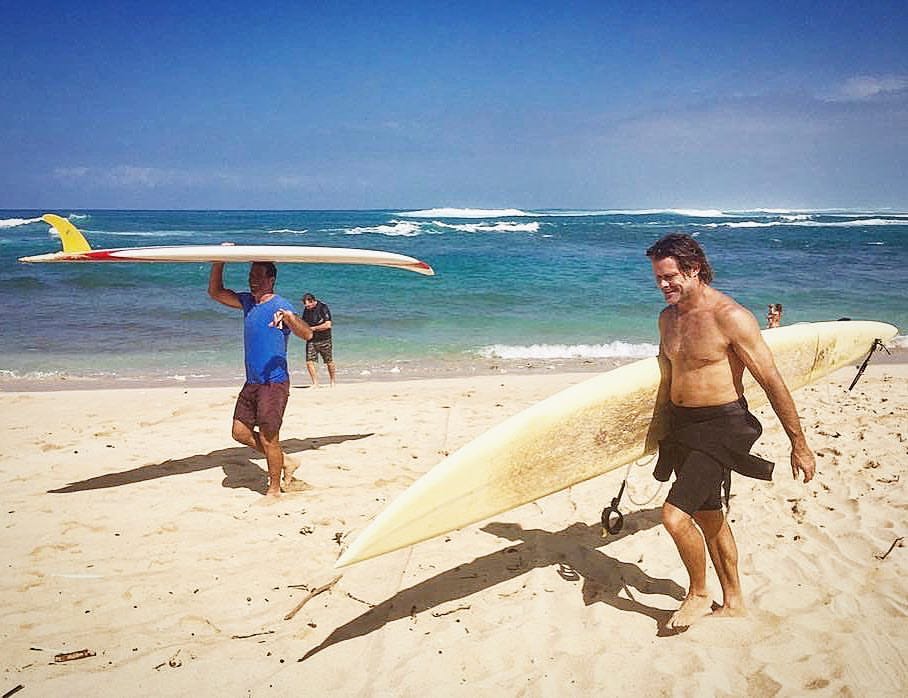
Pau (the end)
Huelo Hale Paumalu 2021
My dissertation was published several years later (2011) in book form: “The Untimely Educator: An Interpretation of Nietzsche’s Philosophy of Education.” Check it out (and buy it) if you’re interested. I stand by my thesis and arguments to this day, indeed I’d say I was rather more than accurate regarding both the significance and relevance of Nietzsche’s thought for us today — educationally and ecologically speaking — as I was then (in 2005).
Rick Williams, now retired, served on the City & County of Honolulu Lifeguards, North Shore since the early 1970s. Originally from the South Bay (Hermosa Beach), Rick represents the classic waterman lifeguard standard: surfer, swimmer, paddler, life-saver, vegetarian, bon vivant extraordinaire. Built his own house up in Pupukea 40 years ago, raised a family (now proud grandfather), and grows most of his own food (as well as supplying many of Haleiwa’s restaurants with his organic produce). Our friend is perhaps holding the most extensive collection of custom Owl Chapman’s anywhere on Earth, including dozens and dozens of cherry boards spanning the ‘70s until last week).
The last one in my possession — a cherry 7’4” swallow tail that Owl shaped for my college graduation (from Hawaii Loa College) in 1992 — sits in on the rack above the washer/dryer out back: I stood in the most perfectly round/circular tube at Yokahama Bay on that board many moons ago. And a few guys have asked to borrow it in contest heats, including: Eric Haas, Mark “Occy” Ochilupo, and Donny Darnell. They all won their heats.
“Drug use,” says Jerry Garcia, “is kind of a cul-de-sac: It’s one of those places you turn with your problems, and pretty soon, all your problems have simply become that one problem. Then it’s just you and the drugs. There was something I needed or thought I needed from drugs. Drugs are like trade-offs in a way — they can be, at any rate. There was something there for me. I don’t know what it was exactly. Maybe it was the thing of being able to distance myself a little from the world. But there was something there I needed for a while; and it wasn’t an entirely negative experience . . . But after a while, it was just the drugs running me; and that’s an intolerable situation. . . It’s a black hole.” “Psychedelic Superstars” in Rolling Stone No. 504/505, July 16-30, 1987.
SEE: e.g.,
Titus Lucretius Carus (birthdate unknown; died mid to late 50s BCE) was an Epicurean poet of the late Roman republican era. His six-book Latin hexameter poem De rerum natura — one of my favorites — variously translated On the nature of things and On the nature of the universe. Lucretius argues that Nothing comes into Being out of nothing or perishes into nothing. The only two per se entities are body and void; all other existing things are inseparable or accidental properties of these (Lucretius’ own terms for which are coniuncta and eventa respectively). Two further items that might be suspected of existing independently of any concurrently existing body or void, (1) time and (2) historical facts, are argued to be in fact existentially parasitic on the presently existing world, and thus not after all per se existents. Lucretius speaks to the basic truths of physics. Body comes in minute and physically indivisible portions, atoms — although Lucretius does not use this Greek loan-word, and prefers a series of circumlocutions such as ‘first beginnings of things’ (primordia rerum), ‘seeds’, and ‘matter’ (materies, derived from mater, ‘mother’), which serve his poetic purposes by evoking the creative powers of these primary particles. It is by their combination into complex structures that all phenomenal beings are generated . . . . Analogously to various modern philosophical attempts to exploit quantum indeterminacy as a basis for psychological indeterminism, interpreters of Lucretius have long debated what relation he postulates between the swerve and free will. Some have read him as positing at least one atomic swerve in the soul to coincide with (and probably help constitute) every new volition. Others have drawn attention to his remark that the swerve is needed ‘so that cause should not follow cause from infinity’ (2.255) and argued that the theory aims merely to ensure that our present self is not the necessary product of our entire past atomic history. A wide variety of further variants have been proposed. — SEE: Stanford Encyclopedia of Philosophy.


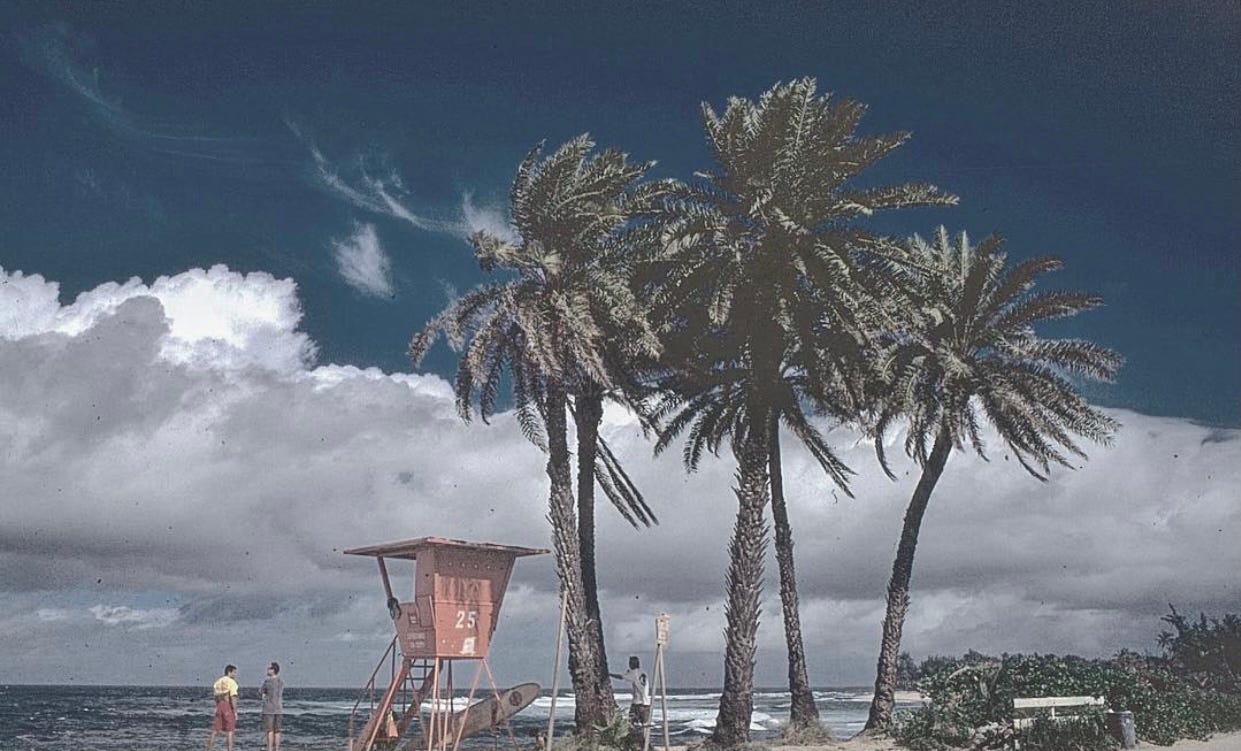



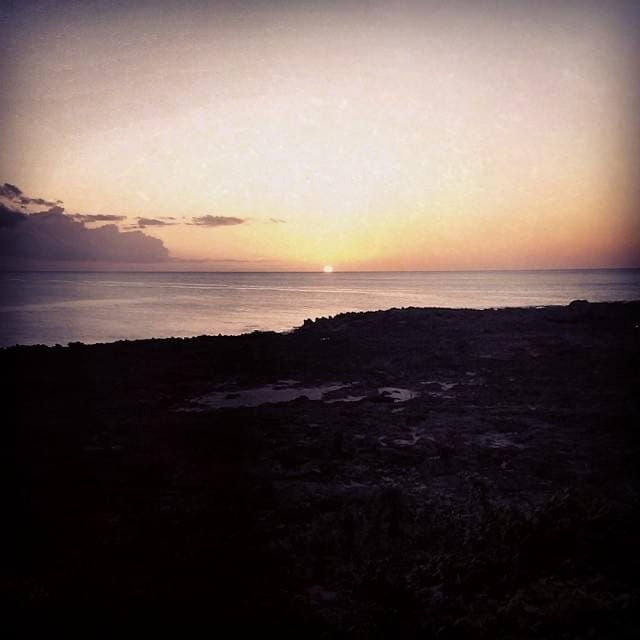
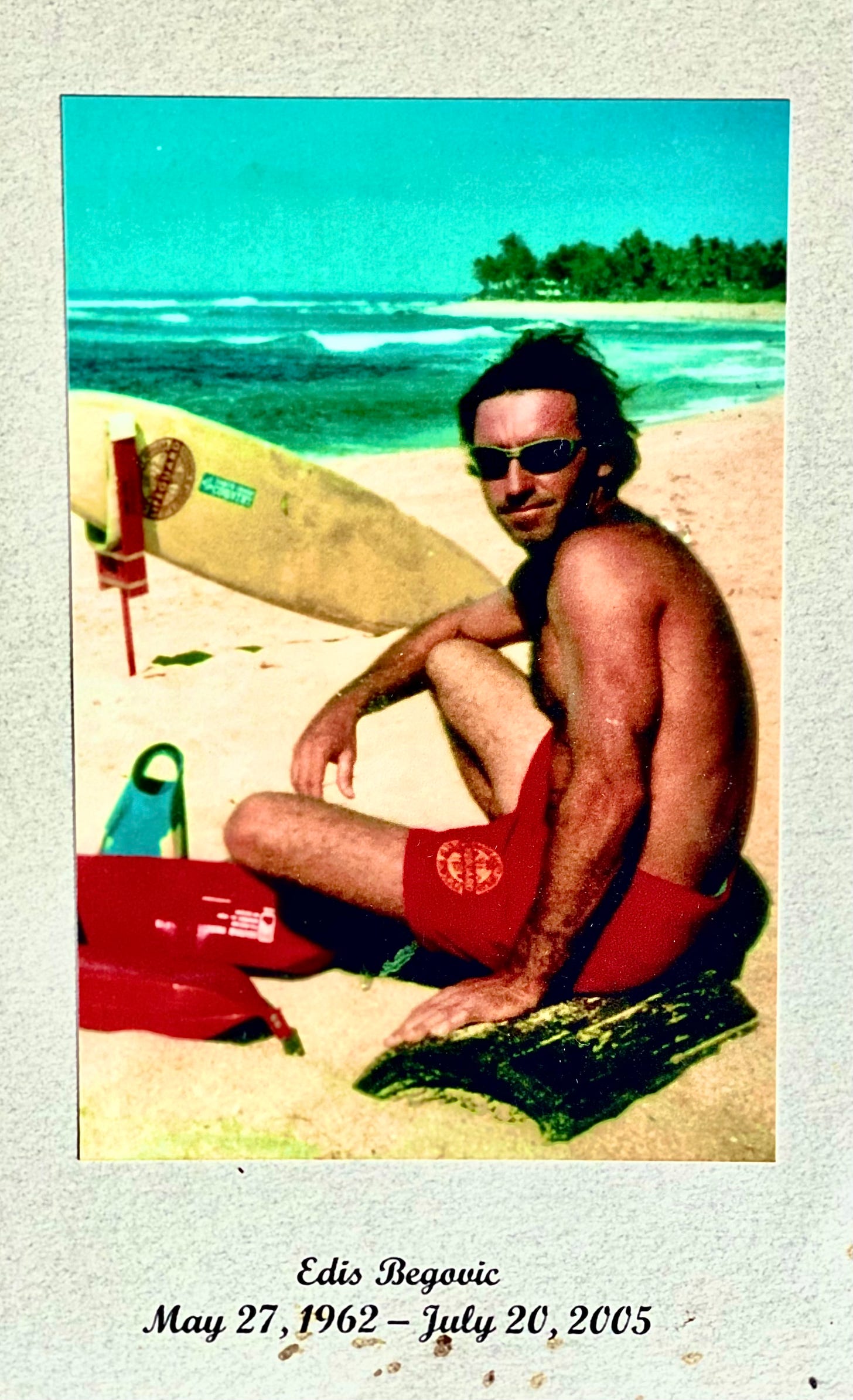
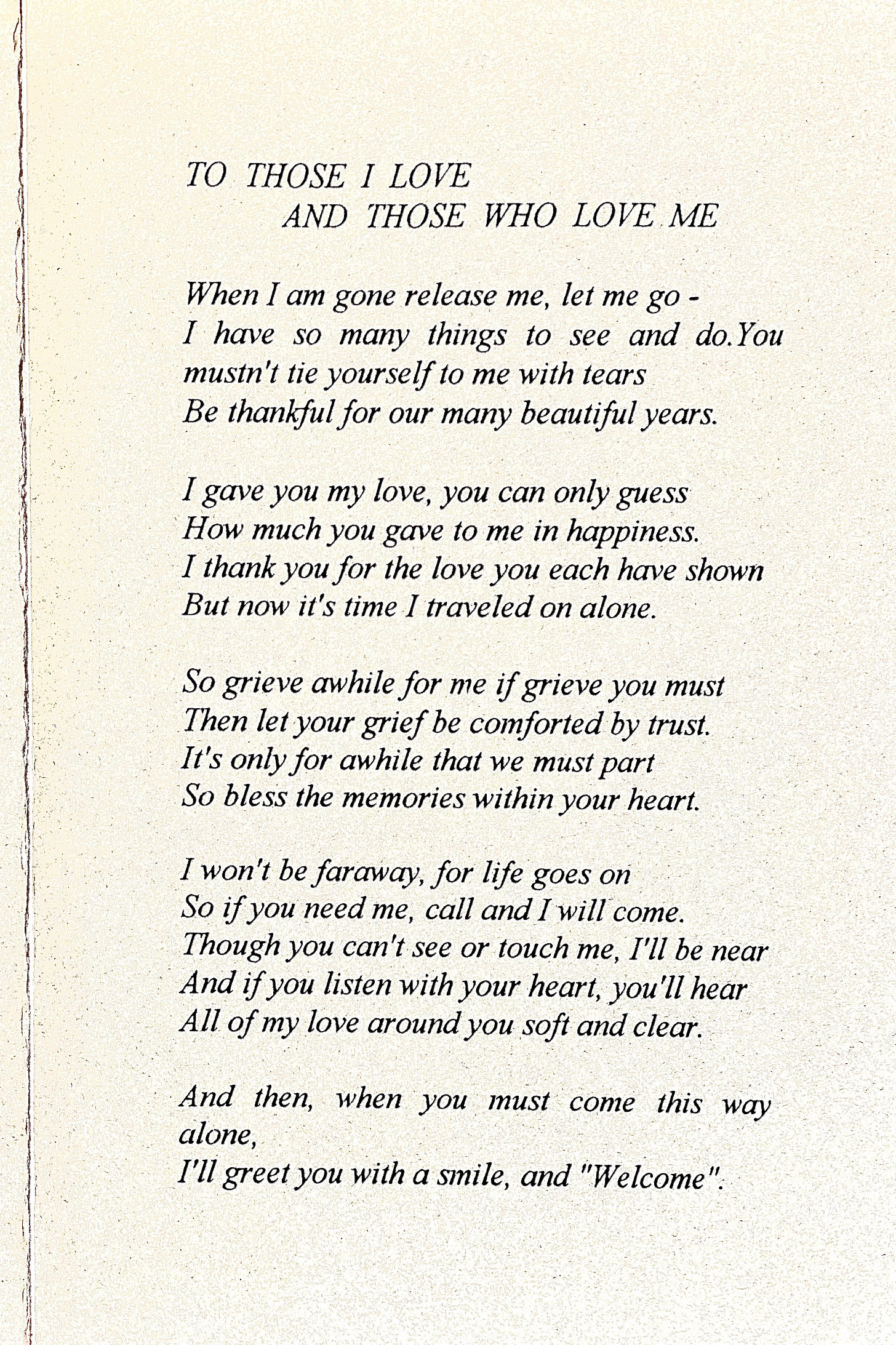


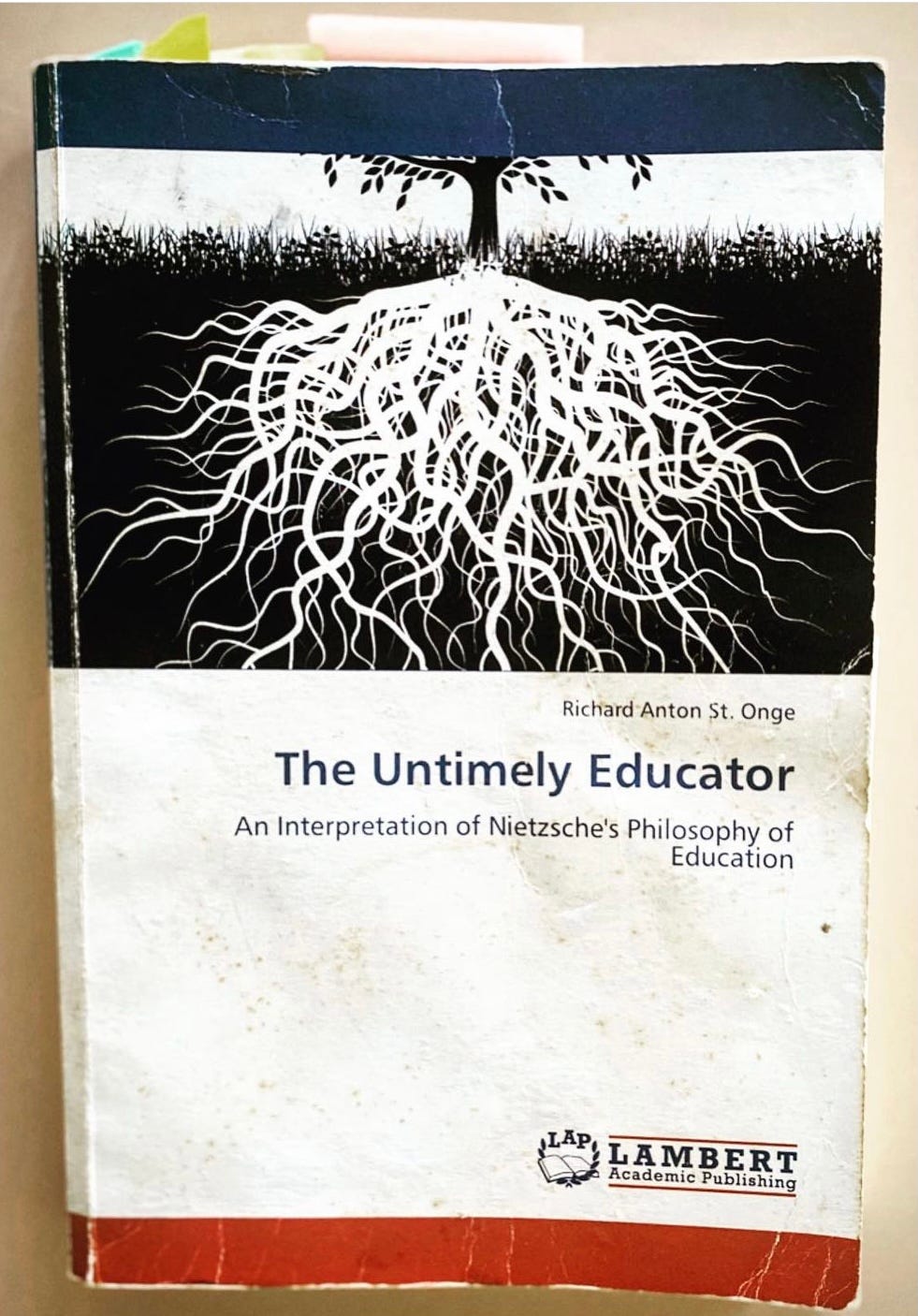
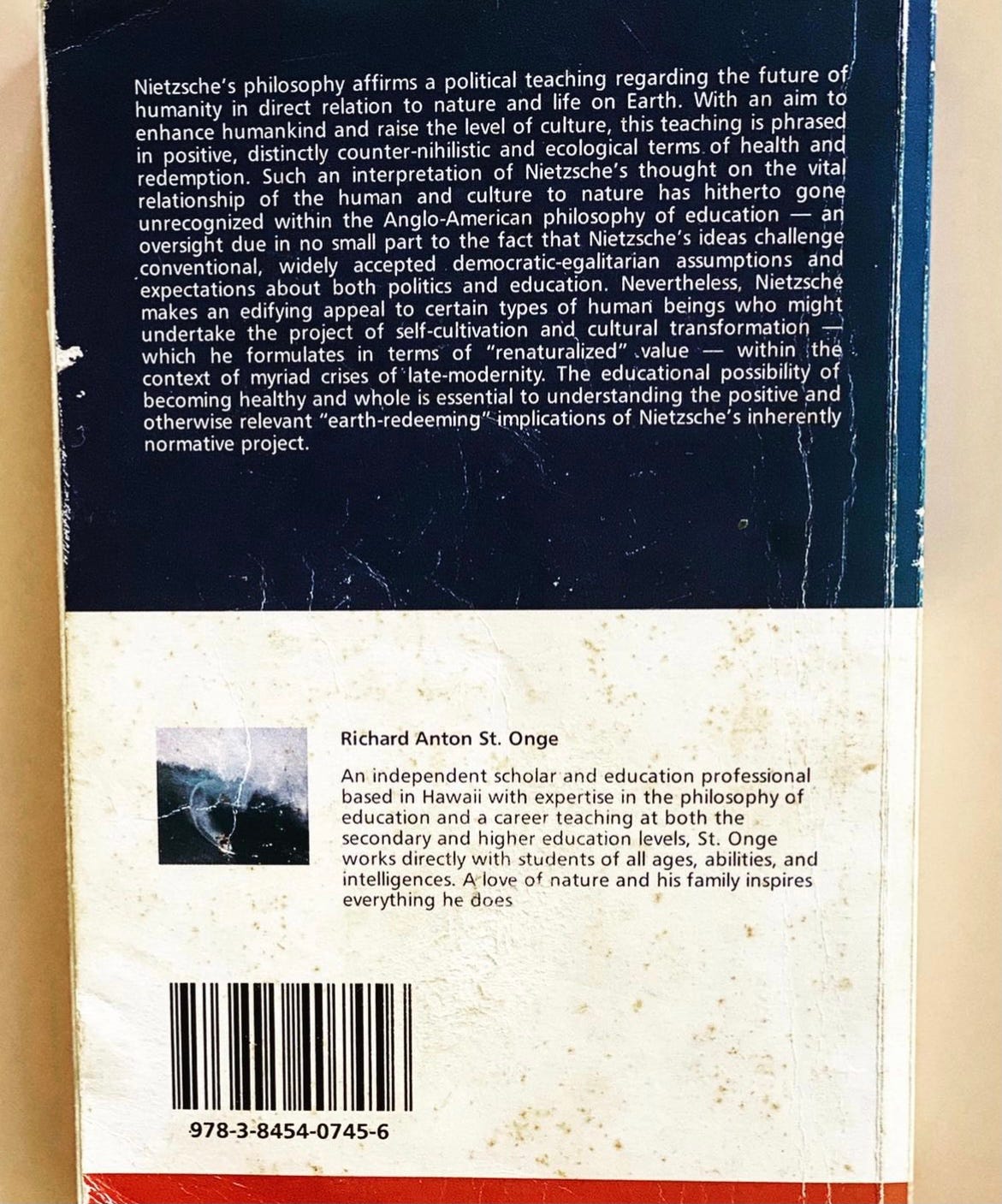
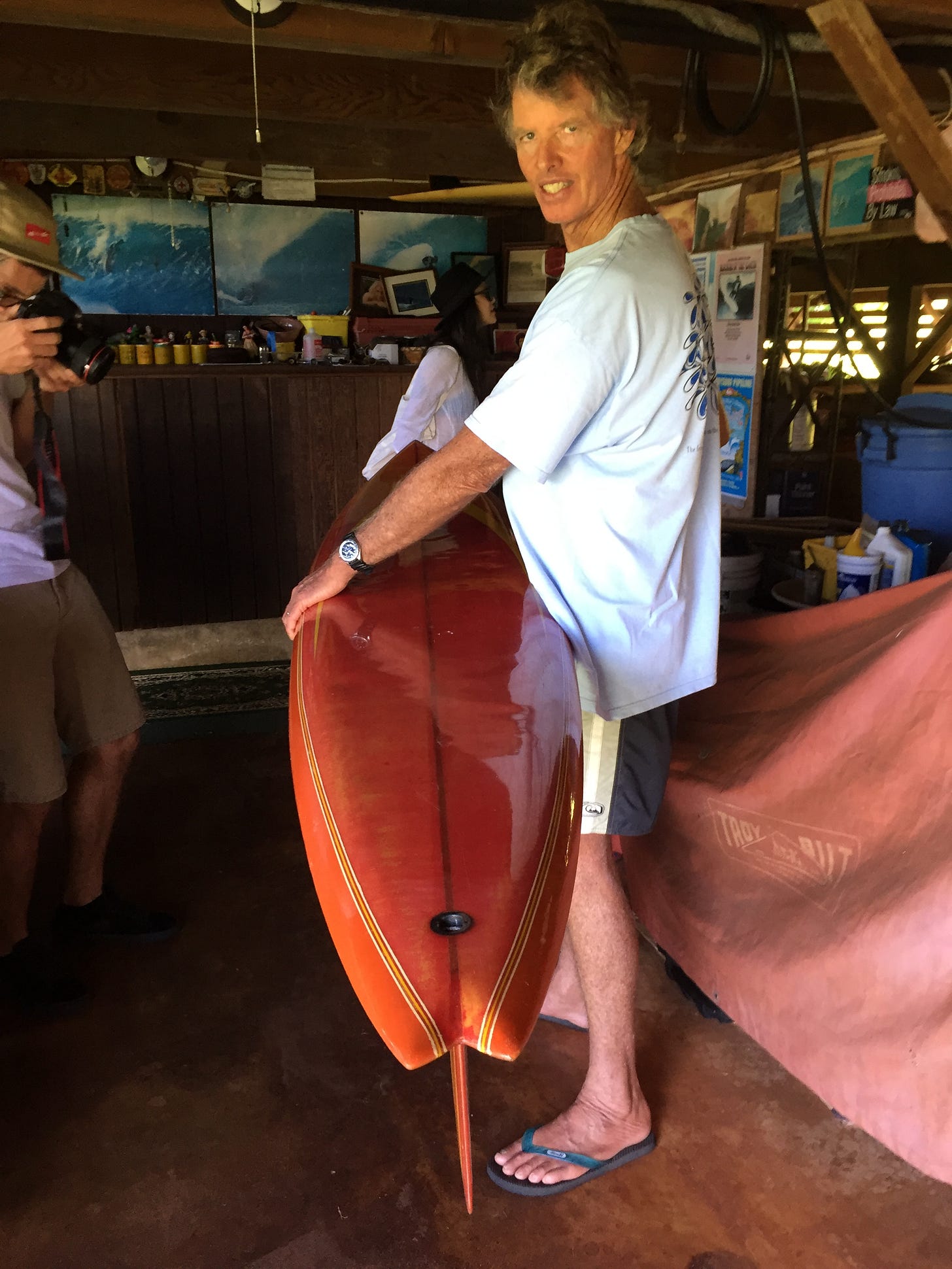

I subscribed because if this article! My brother Dennis was his best friend on the mainland. Edis taught him to glass when he was still a grom. We were devastated at his loss. My brother shared your incredible tribute this morning. He said he cried through the whole read. I made my profile pic that of my bride and I with Edis in late June of 1992 while on our Honeymoon. We drove to see him while on duty on the South Shore. It was the last lifeguard position on that side of the island. I don't recall the beach but it was a long stretch and no one was on the beach that day. That was the last time I saw Edis. He will always be loved and fondly remembered. I live in San Pedro which was a second home to him. My brother and Edis were glassing for Wayne Miyata when they became friends and were always together until Edis moved to O’ahu. Thank you for the insight into his death and continuance. It brought some much appreciated closure. Mahalo!
I'm Edis's sister Adela, I.just came across this article. There was so much confusion after his death, we knew some of what happened..but had no idea the details. I recently had a psychic reading and asked about Edis. For.some.reason something prompted me to.google him online, and found your article. Now I know what happened. I always wondered all this time, so thank you. Adela